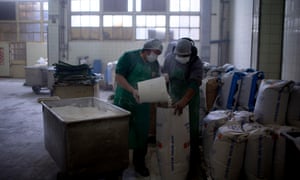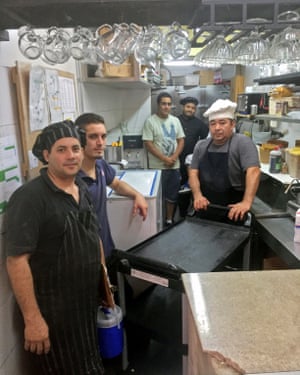The Hotel Bauen in downtown Buenos Aires looks like its best days are behind it. The art deco interior is crumbling, three of the lifts are out, and the whole place looks like it could do with a lick of paint. It’s an unlikely candidate to be at the centre of perhaps the most successful worker occupation movement in the world.
Bauen was opened in 1978, thanks in no small part to a subsidy from the military junta of the time, to provide five-star accommodation for travellers to the World Cup held in the country that same year. The 22-floor hotel suffered many ups and downs over the ensuing years before being declared bankrupt in late 2001. Two years later, the workers occupied the dormant hotel, took control of operations, and tried their best to run it themselves.
It was the latest domino to fall in the burgeoning movement of empresas recuperadas (recovered businesses) which began in the late nineties but picked up a head of steam in the aftermath of the cataclysmic financial crisis of 2001, which saw Argentina suffering the biggest sovereign debt default in world history.
In the aftermath, workers went back to factories that were lying empty after the companies went under. As bankruptcies were declared, the workers had to win the right in court to take over possession of the property and machines. The movement achieved many early successes, and was depicted famously in Naomi Klein and Avi Lewis’s 2004 film, The Take.
When the movement began, the motto was “Occupy. Resist. Produce”. In 2016, the workers of Buenos Aires are still doing that. Hotel Bauen has spent well over a decade under worker control, as have many other businesses in Buenos Aires.
The success of the model, of course, has implications far beyond Buenos Aires. Despite the Occupy movement in the US and UK capturing the public mood in 2011, it died down not long after it started, and is now, it seems, ancient history. As cities around the world are increasingly given over to corporate interests and public space sold off, Buenos Aires is an example of a reverse trend – the capture and retention by citizens of their own spaces.
Most importantly, the cooperative movement has diversified to take in not only hotels such as Bauen but restaurants, trash collection, construction, health, education, media and transport. Not all have been successful, but on the whole it has worked out. Now, however, many are worried that Argentina’s new right wing president will put a stop to these models.
Armando Casado, the gregarious 66-year-old waiter serving drinks and food to the men playing cards in the hotel restaurant, has been working here for a quarter of a century. He has seen it under private management and now under worker control.
“Before it was a job like any other,” he says, with a hint of nostalgia. “There was an owner, a boss, there was an organigram to try and make you effective. Here you have freedom – but you need to be effective. It’s not as efficient as before, but we have more liberty.”
In 2014, there were 311 occupied businesses across Argentina, with around half based in Buenos Aires, according to the Open Faculty Programme of the Universidad de Buenos Aires. Of those, nearly half have sprung up after 2004 when the country was already on the path towards economic recovery. This is an indication, the researchers conclude, that the model has proved useful beyond an immediate response to financial crisis. It is now being viewed as a viable and sustainable business model in better times, too. They conclude that the movement is, in fact, a workers’ rebellion “against the fatalism of the economy and the ideology of neoliberal capitalism”.
While the fabricas tomadas (taken factories) garnered much of the attention around the world, in fact, Buenos Aires is now dotted with worker-owned businesses that provide all kinds of services and products. It has become the world’s first and most durable occupied city. You will be in a restaurant and notice the breadsticks are made by a cooperativa, or be in the street and notice the trash collector next to you is a part of another cooperativa. The Argentinian occupations have not only been a success for more than a decade, but are still expanding. So how have they managed it?
“If I was going to summarise the main variable for the success of the recovered factories in Argentina, it is desperation,” says Esteban Magnani, an Argentinian journalist who wrote the only book on the phenomenon that is available in English, The Silent Change: Recovered Businesses in Argentina. “In the 90s there were no alternatives for workers, and getting fired from work meant the end. So if you get enough desperate people, you start to build up a system to recover factories.”
Another element which helped the movement was that, under the administrations of left-wing presidents Nestor and Cristina Kirchner, they did not have a hostile government in power.
“The Kirchner governments annulled the bankruptcy law and added a clause which allowed workers to stay in the factories where they were working, in exchange for taking on the company’s debts and constructing a cooperative structure,” says Andrés Ruggeri, director of the Open Faculty Programme. “But in general, Kichnerism has supported [the occupied business movement] in an ambiguous way. They don’t use repression, they are not hostile, they don’t want to evict, but neither are they very in favour.”
That has now changed. In December 2015, Mauricio Macri, the right-wing businessman and former mayor of Buenos Aires, became president of Argentina, ending over a decade of Kirchnerismo. His record vis-a-vis the cooperatives while mayor of the city was not a good one, and many workers are worried he will try to destroy the model once and for all. It is not an idle threat.

“At one point Macri vetoed the law which would give the cooperative ownership of the hotel,” Patricia Guzman, who works in the administration of Hotel Bauen, tells us. “He was one of the politicians who vetoed it when the workers put it forward to the city government in 2004. He was also very closely politically aligned to the old owners, so today we are very afraid that he is president; the city government could now come and take everything away from us.”
Casado adds: “Macri made clear while he was mayor that he’d like to shut down the coop but he couldn’t because of the profile – nationally and internationally – of the hotel and the support the hotel has. Macri is afraid of this”.
It is natural that politicians such as Macri would not like thesecooperativas: their success flies in the face of everything we are told about capitalism and how it has to run. Say that workers can run their own affairs, socialise profits, organise production democratically and still be successful and you would be laughed out of most economics departments.
Not everything is rosy, certainly. The Hotel Bauen has many problems, from the lack of clients – only 18 of the 200-plus rooms are booked up on the day we visit – to ongoing uncertainty about its legal future, to what Casado calls “internal problems”. He is not completely sold on the worker-ownership model, arguing that it affects the quality of the service, and there may even be a surfeit of democracy and freedom now.
“The hotel has a special dynamic, it’s a city within a city,” he says. “Politically the co-op model is definitely better because we have more liberty. We can come in 20 minutes late and it’s not a problem, they understand – whereas in another place the boss would write a report on you about it. That liberty is good, but it’s that same liberty that people abuse. It’s what’s led us to having to introduce policies that are as, or more, strict than private companies.

“For example, we have to sign in with our fingerprints, because at first we tried having people sign in with their signatures, but people abused that by having others sign in for them and came in late. After that we tried with a card, and likewise people would give their card to another member of staff to sign in on their behalf. So then we started to use the fingerprints, the same as at a private company. Which leads me to ask myself: why do we have to take these measures? If we were born to be free – not like a private company – why do we end up in a situation where we have to introduce the same policies as in a private company?”
On top of the the internal problems, there are constant legal battles to fight as these new institutions try to make their model legitimate in the eyes of the law, which has often been hostile. “We are constantly afraid that we might be turfed out at any moment,” says Guzman. In 2014, the Supreme Court stated thatworkers had to vacate the premises by the end of April. They are still there, but the fight is never over.
Guzman, 35, from Buenos Aires, was having money difficulties when she stumbled upon the revolution happening at Bauen. “I started working here as a cleaner,” she explains. “At the time I didn’t know what a cooperative was. Then I went on to work in different areas within the hotel, and now I’m part of the administration team. It’s been a really positive experience for me: when I started working here each person would do their job, complete their work hours and then just go home. Now that I’m involved in the co-op secretariat, we make sure that staff have more input and participate more.”
Around 130 people work at Bauen, but there are no bosses. Guzman earns a salary of between 4,000 and 4,500 pesos (£187-210) per month; in a city where prices are not too different to London, this is far from adequate.
“It’s below the minimum wage in Argentina, because what we earn is based on what’s left over after we make the deductions we have to make for the hotel to run,” she explains. “Every three months at the assembly, we assess whether we can give any addition to the basic wage, which is 3,000 pesos [£140] and it’s that addition which varies each month based on how business is going.
“At the moment we are going through a tough time economically, so all of us agreed to sacrifice a bit of our wage. It’s basically sacrificing pay for a couple of days per month in order to stay afloat. But for the moment I feel comfortable here; I wouldn’t look for work elsewhere.”
Beacon to the world?
Fifteen minutes’ drive west along the bustling, commercial thoroughfare Avenida Corrientes takes you to Ale Ale, one of the city’s many parrilla restaurants and another cooperativa. Sergio Cano, the 42-year-old head of the kitchen, has worked here for 13 years and seen it under both private and worker control. He remembers well the moment they were told they would lose their job.
“One day, the restaurant supervisors came in and told us that the restaurant was about to go bust and that they were about to close down at any moment,” he says. “So we had a meeting of all the workers. Some of us had been working here for decades, and one of my colleagues suggested the idea of taking over the place and running it ourselves. He knew people at the Hotel Bauen, and they advised us until we occupied the restaurant.”

Ale Ale is a family-friendly restaurant serving traditional Argentinian cuisine, from sirloin steak to pasta dishes and minutas (simple, quick dishes). Kids run around the tables, while babies play in the special kids zone complete with toys and animal wallpaper.
Every co-op business gets advice from other co-ops – principally the Bauen, which has taken on the role of mentor to businesses wanting to take on the worker-ownership model – but then create their own bespoke structure. In Ale Ale, the 33 socios (founders) are the owners of the co-op, with associates and workers coming after.
“Now we’re doing well, we are taking this place forward,” Cano says. “There are 44 of us in total now, and we have had various ups and downs. We were evicted so we had to find a new site for the restaurant. The owner of the current site saw an item on the news about us, and offered to rent this place out to us.” They moved here in 2014.
“At first it was difficult because we didn’t really understand what we had to do or how we were going to do it,” Cano recalls. Now, the workers pay social security and have a small pension; the previous owners only paid social security for two out of the 12 years that Cano worked at the restaurant. “Now if one of us gets sick, or if my son becomes ill, we’re covered,” he says.
Buenos Aires is not the coda to this story, but the introduction. A similar model has percolated out to other cities, from Chicago to Ciudad Juárez to Delhi. In Venezuela, the government itself nationalised companies and set up worker cooperatives, apparently seeking for advice from the movement in Argentina.
Casado lets out a chuckle when I ask what it’s like to be a beacon to the world. “Cooperativism is very nice conceptually,” he says, raising an eyebrow. “But once you’re inside, you have to ask, ‘how do you make it work?’”
Travel funding for this article was provided by the Pulitzer Center on Crisis Reporting. Follow Guardian Cities on Twitter and Facebook and join the discussion